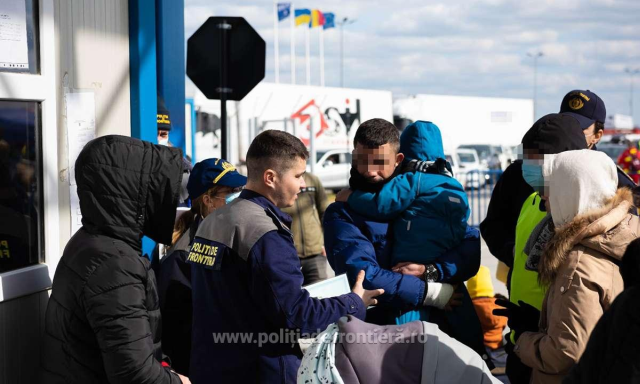Ukrainian Female Refugees in Romania
Since the start of the war in Ukraine, 3.5 million Ukrainians have entered Romania

Christine Leșcu, 08.03.2023, 14:00
Since the start of the war in Ukraine, 3.5 million Ukrainians have entered Romania, and, of them, about 100,000 have settled here temporarily. Of the ones who made this choice, over 5,700 got work contracts, according to the latest data from the Ministry of Labor. As most of the people who decided to stay are women with preschool children, it makes sense that a significant portion of them have found jobs here. Among them are the beneficiaries of the Seneca Association, a charitable NGO who is also running a bookstore. Association founder Anastasia Staicu was, in fact, present from the first days of the war at the border between Romania and Ukraine, in order to help refugees with translation services, since her primary language is Russian. This kind of help started diversifying, and Anastasia gradually came to help the mothers, daughters, and grandmothers who settled in Bucharest integrate into Romanian society. Let’s listen to her:
“This is a community of over 200 people who learned Romanian at the Anticafe Seneca, where we have intensive Romanian classes. They make friends amongst themselves, and we are also making friends. We set up a room particularly for this purpose. It is like a classroom that can accommodate about 20 people. We have to say we would not have made it if we didn’t have with us a flawless teacher, Ms. Rodica Fagut. These are not just intensive language courses, but also courses in cultural and social integration. They go together to theaters, they watch together old Romanian movies, and newer ones too. It is a community that is truly dedicated to integration.
Anastasia Staicu managed to hire as bookstore attendandts three of the members of this community, after they gained an acceptable level of Romanian. These jobs help these women gain a living, but also adapt to an unfamiliar country, just as the war in Ukraine seems to last longer and longer. Here she is telling us about it:
“Before they sign up for the courses, we have them fill in the reason why they want to learn Romanian. If, in the early war, the main reason was ‘so I can get by in the street’, ‘so I can talk to people I have met’, now more than half say that they want to get a job here, and settle for the longer run.
Since most of these women are mothers, their main concern is their children. The Romanian state provided them with a few pilot school centers, where they can continue their studies. Since these are not coping with demand, it was decided that for the next year Ukrainian children should start being integrated in Romanian schools. This, obviously, raises a number of concerns, as Anastasia Staicu told us:
“There are six hub schools in Bucharest, with more around the country. I know that, starting with the next school year, these children will have to be integrated into Romanian schools. Legally speaking, the assumption is that they had a preparatory Romanian language course. The fact that now they will simply be signed up for Romanian schools without even this preparatory course will be further trauma for them. Maybe the little ones will adapt. But the teenagers, those between 13 and 17, will have to learn right along with the others a curriculum that is not so easy. I know they will have a hard time. Now more people get the fact that the war will last two more years at the least. Women put children first, they understand very well that they have to focus on their children. They deserve more support, more organized support, especially in education.’
Among the women from Ukraine that put their child first was Caterina, who came with her son to Romania a year ago. Here she is telling her story:
“When I came here I was in depression, like everyone else, it is not easy leaving behind home and family, to cross the border into the unknown with your child. Not much later, I understood I had no road forward except by adapting, because I am the only one responsible for my child. At first I could not find a job, and I got hired at a social assistance center, where I was helping the mothers and their children who needed housing, transportation, and documentation. After that I was lucky to get hired here, at Seneca, where we have a friendly group, where we help each other, and continue to help Ukrainian citizens. My whole family was left behind in Ukraine, from grandparents, to parents, to my husband. We keep in touch as much as the Internet allows, and we all hope in a victory.
Caterina was helped by the Seneca Association not only to find a job, but also form a support network made up of mostly women refugees from Ukraine, but also Romanians willing to help. In this way, she is able to weather this difficult period with more ease, trying to keep up a smile and her optimism. The same is true for Tatiana, a woman who arrived a year ago from Ukraine with her 12 year-old daughter, three cats, and a little dog. They were helped by a friend who had already settled in Romania. After the anguish of leaving her country, the uncertainty of the road, of crossing the border into an unknown country, Tatiana adapted gradually, learning Romanian, and becoming a bookstore attendant. She also got to know the country better. Here she is telling us about it:
“During the first 4 or 5 months I got to know Romanian. The friend I found here goes kayaking. He took me and my daughter on every one of his kayaking trips. He found housing for me, which was very difficult, considering how many pets I have. But for me, discovering Romania was a revelation. Now it is much easier, of course. During the time I spent here I started learning the language, which changed everything, because you no longer feel like an intruder. For me and my child it is not yet safe to return to Ukraine. Speaking of my daughter, for her adaptation is more difficult. It is pretty difficult without knowing the language. However, she has a pretty friendly atmosphere around her. Her teachers and colleagues are very open, and, in addition, she knows pretty good English, and that helps a lot. She is adapting, but it takes time.
For now, it looks like these women will have a long time to spend in Romania. But, since their inner strength helped them through the worst times of becoming refugees, they will continue having the daring that is needed to face down future challenges.






























